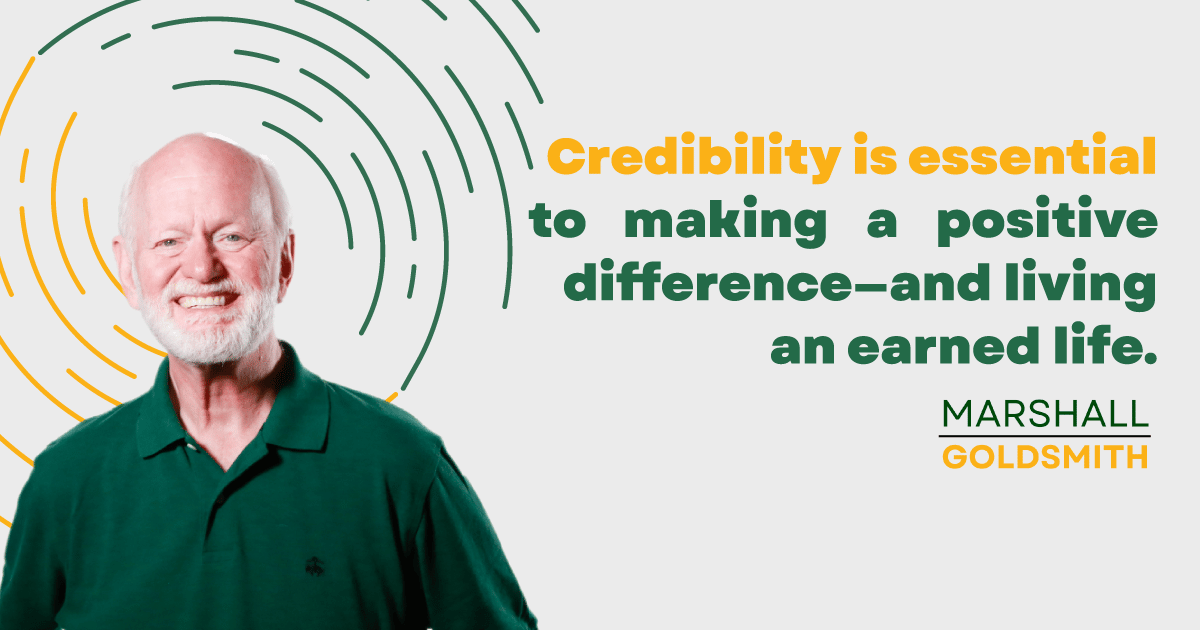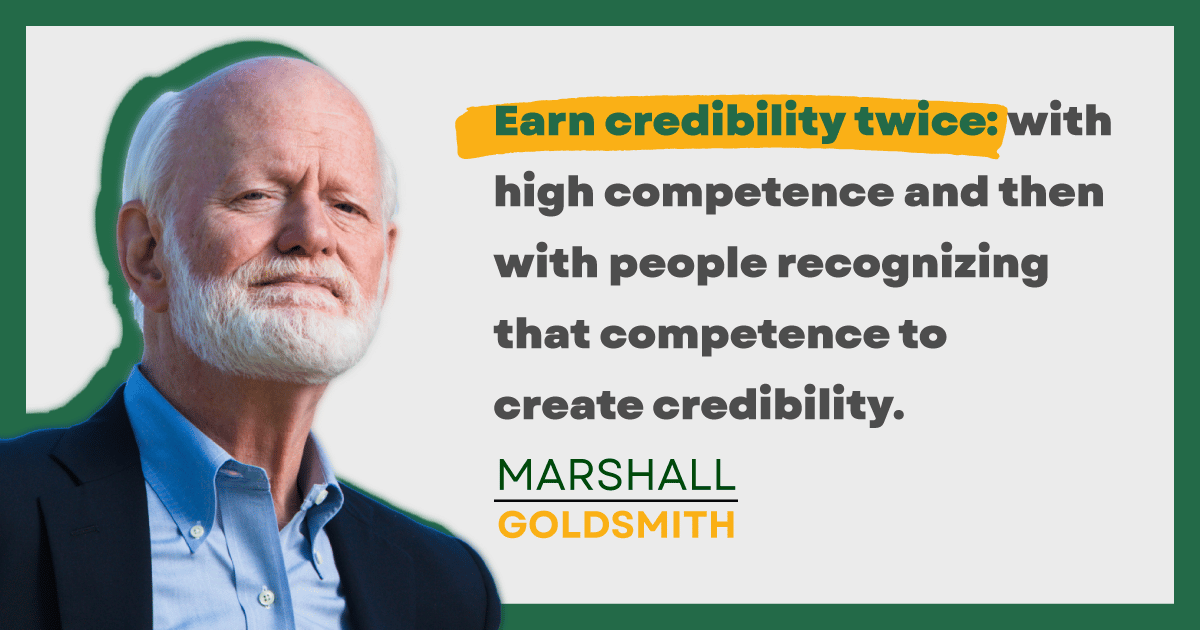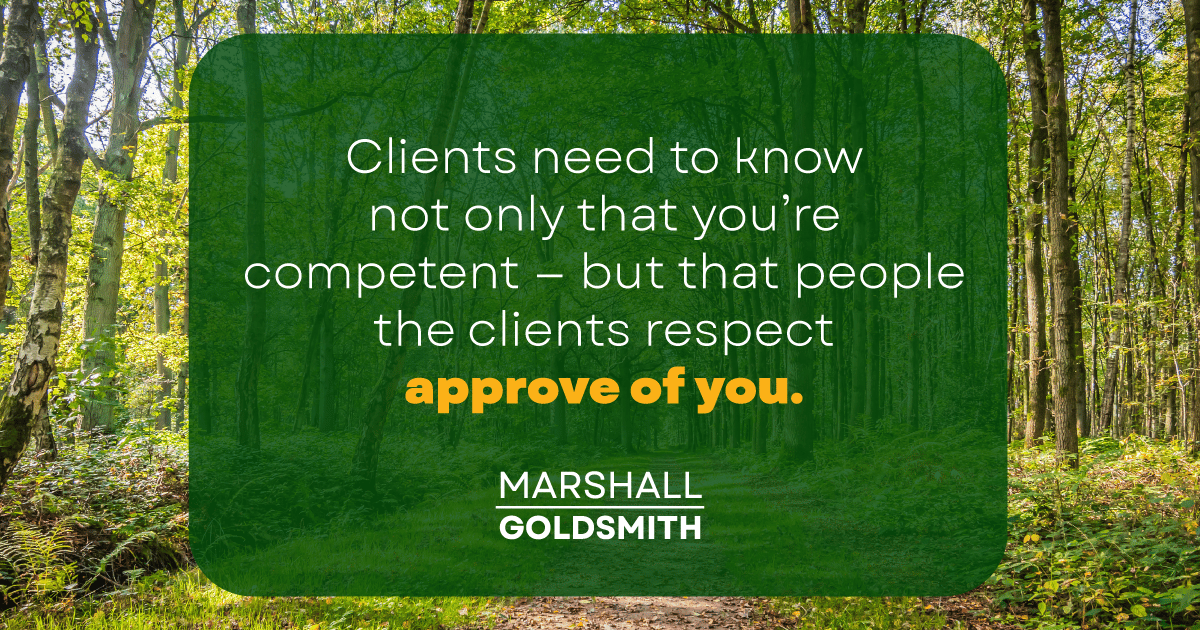Playing Favorites By Marshall Goldsmith There’s a reason I devote...
Some 25 years ago, I committed to the goal of earning credibility.
Clients need to know not only that you’re competent — but that people the clients respect approve of you. I realized that I had to earn credibility twice: with high competence and then with people noticing that competence and recognizing it, creating credibility.
Our experience tells us that being happy doesn’t deliver achievement and, vice versa, achievement doesn’t always deliver happiness. After all, many high achievers are miserable or depressed. In the same way that achievement and happiness are independent variables, earning competence does not automatically guarantee that I would be recognized for it.
Greater competence and recognition for it are two independent variables that I would have to connect for others to see.
To acquire larger credibility as a coach, I would have to become well-known. This recognition would not be given to me. I would have to get out of my comfort zone of “just doing the work” by adding a new essential task to my definition of “just doing the work”—namely, becoming better known.
My good work was no longer going to “speak for itself.” That hubris may have worked 50 years ago, in simpler times. But today it’s an incomplete strategy. You not only have to tell a good story that speaks for itself, you have to sell your ability at storytelling.

an achievement at work or you want to get your new start-up noticed — is the new additional price you have to pay for success in a rapidly changing environment. You can reasonably argue that accepting the awkward duties of self-marketing serves the aspirational purpose of making a positive difference.
This has become a telling part of my coaching now, but first I had to test it on myself. I conducted a Socratic dialogue with four questions:
When I can convince myself that any uncomfortable task is for a greater good, my discomfort suddenly becomes a price that I’m happy to pay.
It’s important to add that, just because we strive for something, it’s not a guarantee that we will achieve it, even when our choices are unimpeachable, our efforts are flawless and complete. The world isn’t always fair to us. If it were, none of us would ever feel ignored or ill treated or otherwise victimized. Being good people with noble intentions, committed to making a positive difference, we would get exactly what we deserve.

At this point in our adult lives, we know that people and circumstances are not always so obliging. If you’ve ever done something wonderful only to have the world ignore it, or even punish you for it, you know this to be true. A lot of times it’s not your fault. Your timing was off. Someone else’s good work stole your thunder. You were drowned out by a louder voice craving attention.
What’s odd is that we see this problem clearly in other people, but rarely accept it as reality when it happens to us. If a friend were launching a retail product today, we’d assume she had a complete marketing plan to draw attention to her brand — advertising; a sophisticated social media campaign; free samples to elicit positive reviews; paid placement on store shelves; free media in the form of press releases, interviews, and profiles — all in the pursuit of recognition and approval that results in a little more credibility for her brand. Anything less would be folly with a retail product.
Yet we don’t automatically translate this to ourselves at work or anywhere else. We may feel that calling attention to ourselves is unseemly and narcissistic. Our great work should speak for itself. We shouldn’t have to do that.
I’ve heard all the excuses, to which I say: You wouldn’t go full tilt in the first half of a game and then phone it in for the second half, expecting a successful result, would you? Then why would you behave the same way when the fate of your hard work, your career, your earned life, hangs in the balance?
This is why we have to come to terms with credibility. As a personal attribute, it is essential to making a positive difference—and living an earned life.

Adding Too Much Value Won’t Get You There By Marshall...
C-Suite Master Class: No, But, However By Marshall Goldsmith Continuing...
The Doerr Institute: Expanding the Market for Coaches By Marshall...
Making Leadership Development Part of the College Degree at Rice...
Sanyin Siang – Winner of the Thinkers50 Marshall Goldsmith Coaching...
Thinkers50 Marshall Goldsmith Distinguished Achievement Award in Coaching – Nominees...
Leading with Influence: What Is Influence360°? By Marshall Goldsmith Founder...
Are You a Dominator, Manipulator, Persuader or Influencer? By Marshall...
Leading with Influence: Redefining Modern Influence Part 2 By Marshall...
My mission is simple. I want to help successful people achieve positive, lasting change and behavior; for themselves, their people, and their teams. I want to help you make your life a little better. With four decades of experience helping top CEOs and executives overcome limiting beliefs and behaviors to achieve greater success, I don’t do this for fame and accolades. I do this because I love helping people!
As an executive educator and coach, I help people understand how our beliefs and the environments we operate in can trigger negative behaviors. Through simple and practical advice, I help people achieve and sustain positive behavioral change.